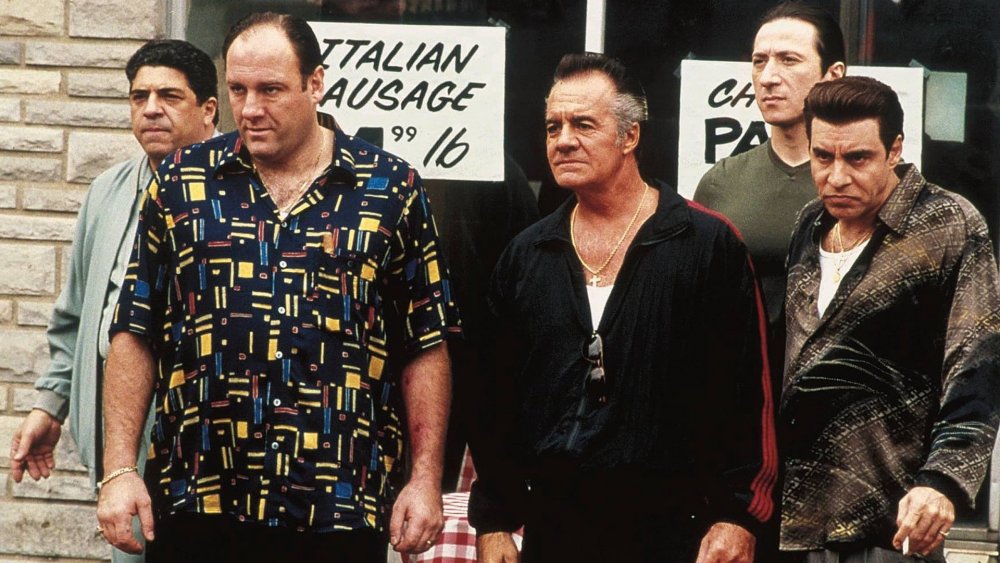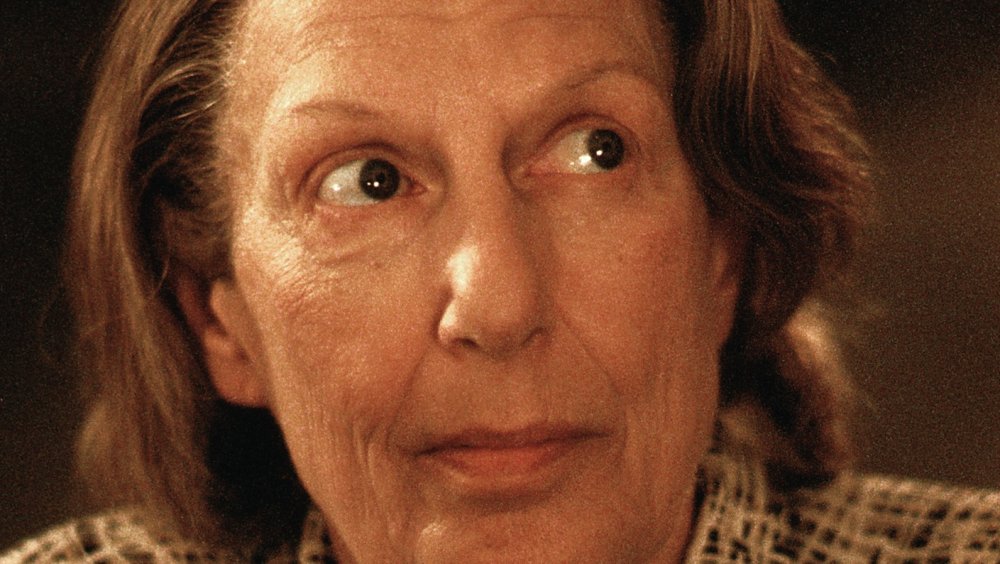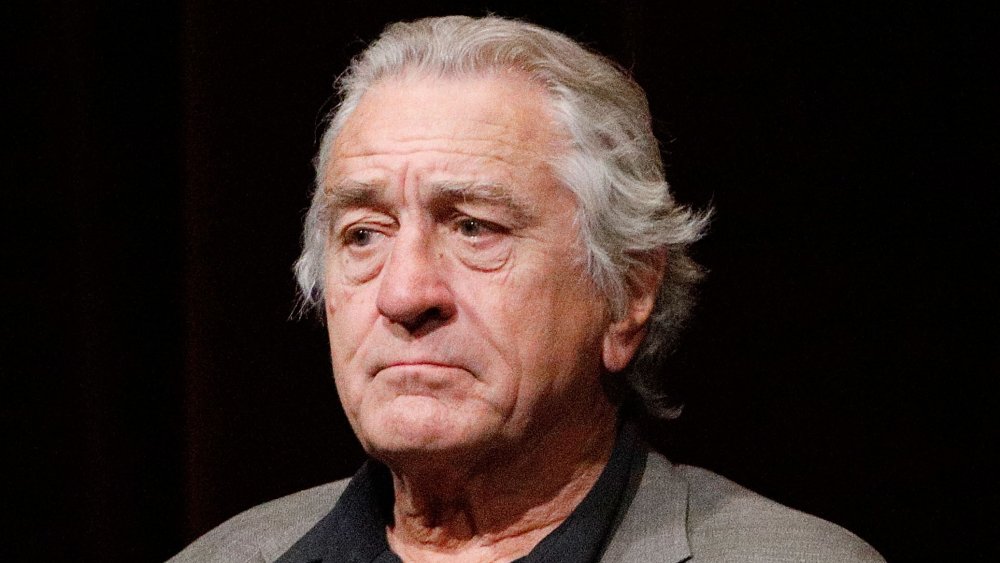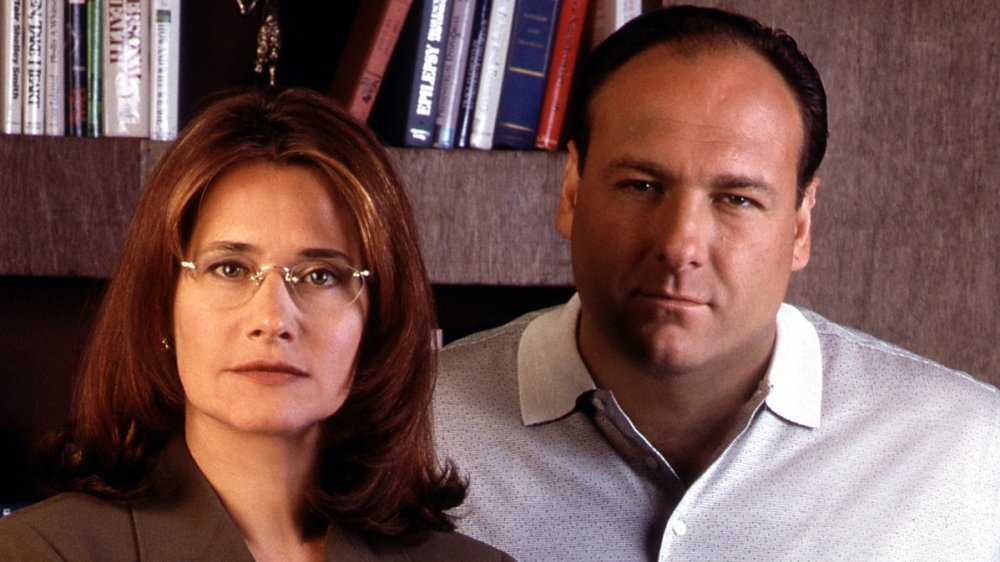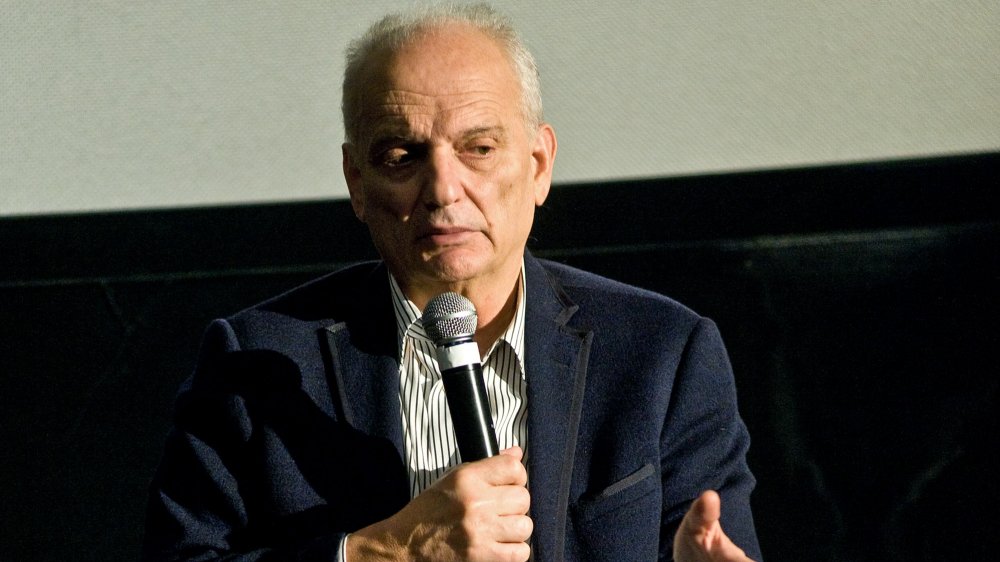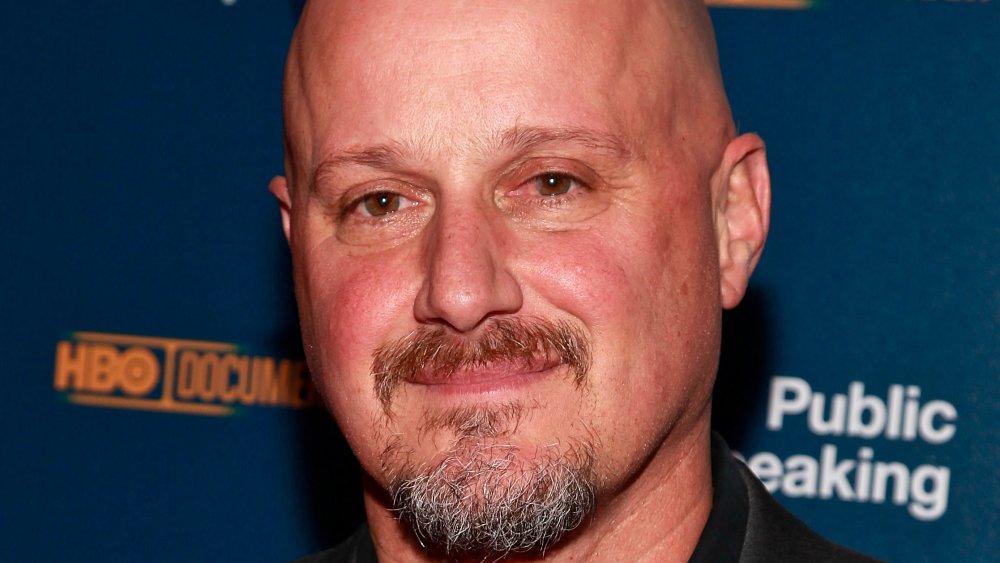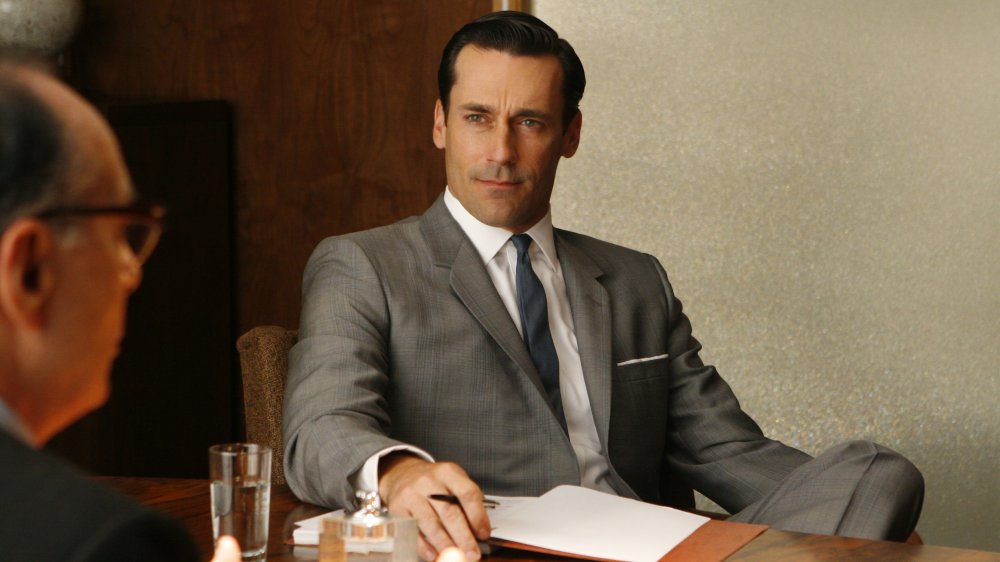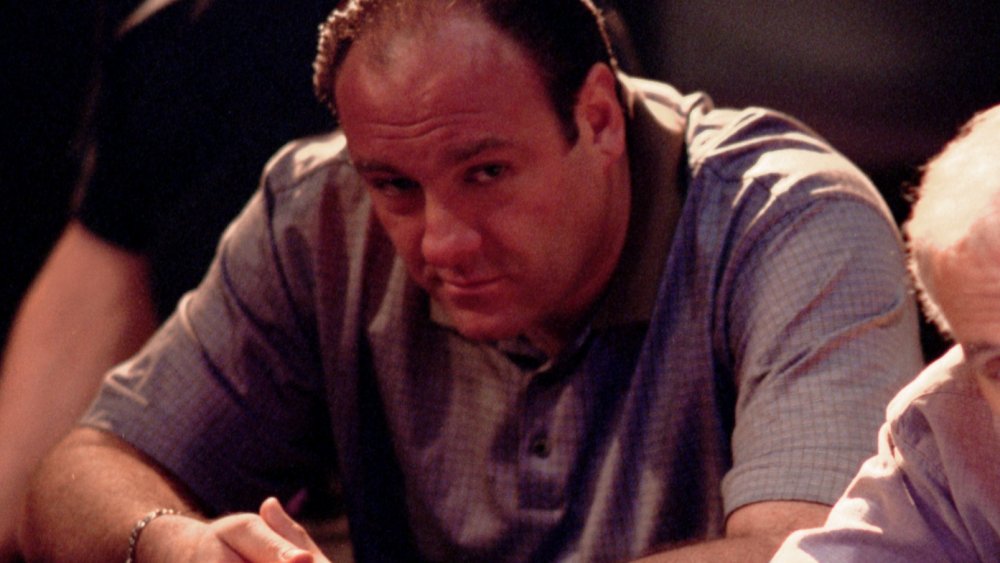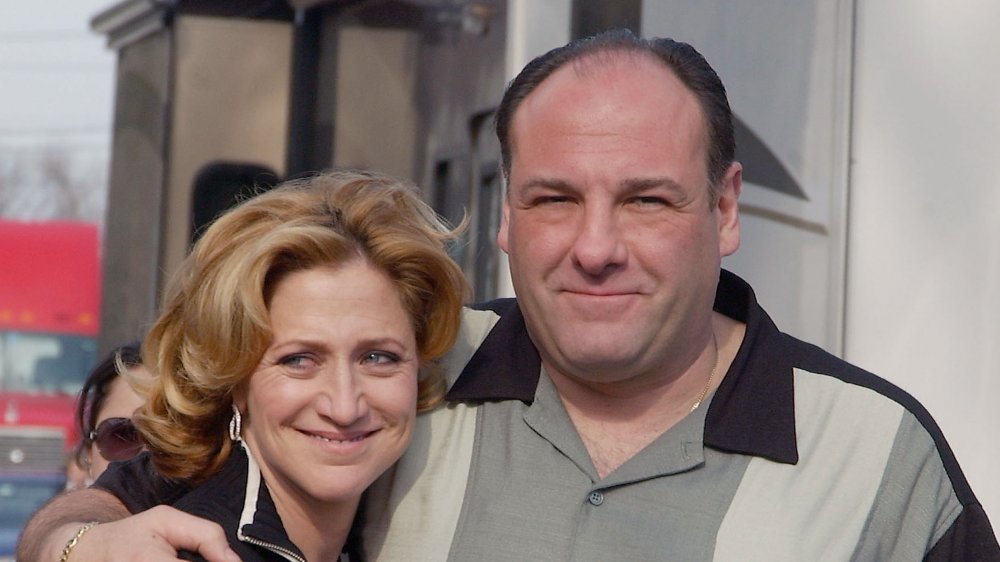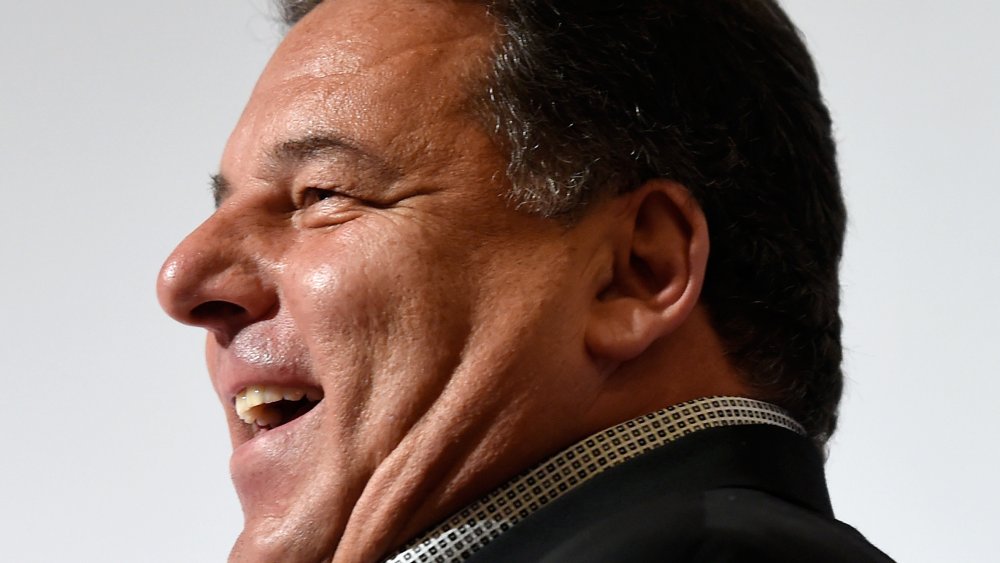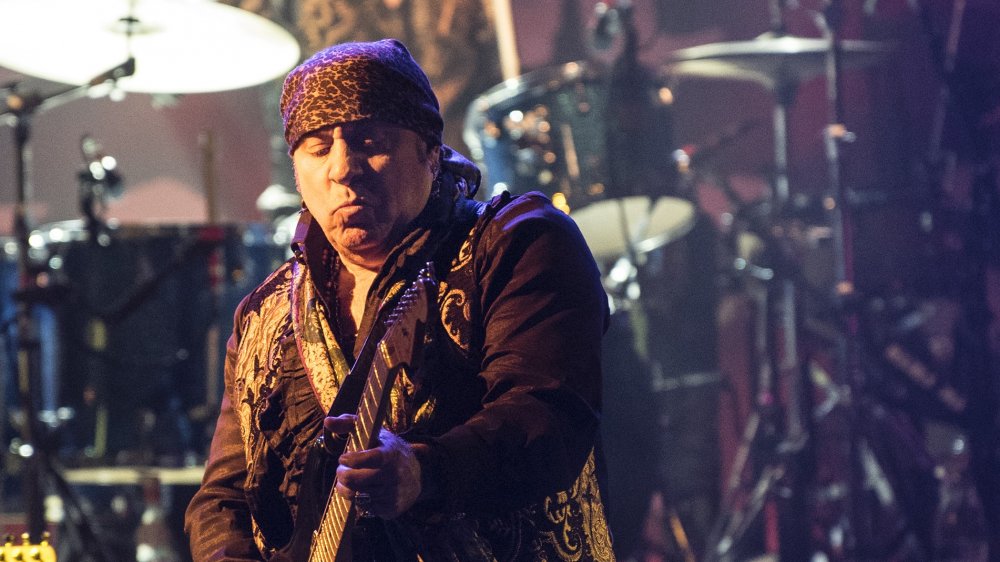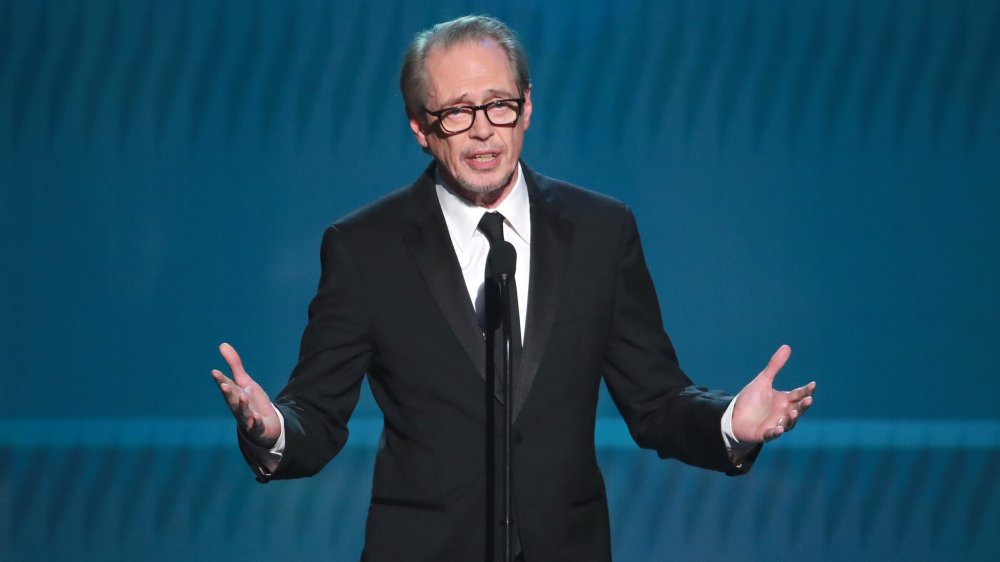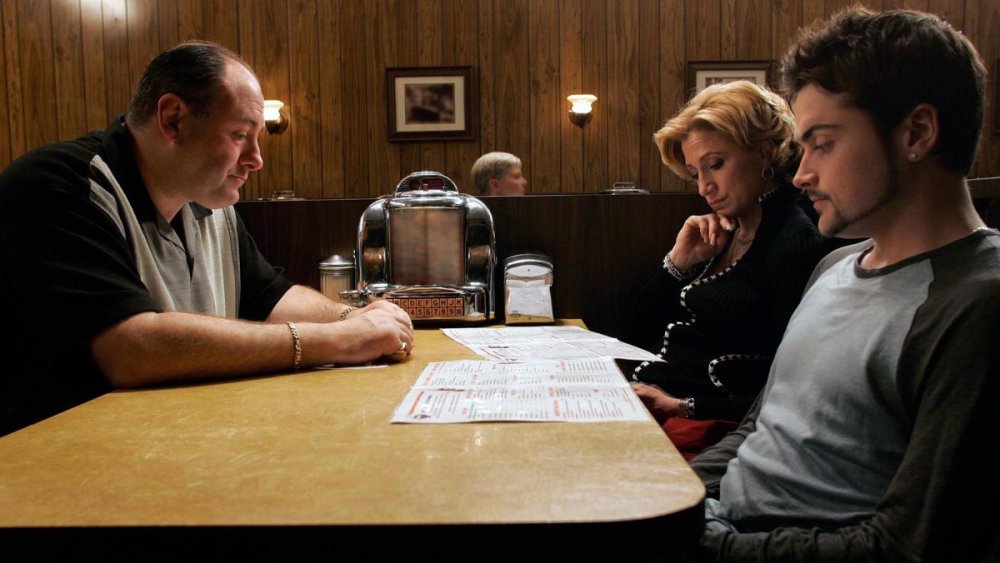The Untold Truth Of The Sopranos
The Sopranos completely changed television during its eight-year run on HBO. The acclaimed hit series taught audiences to love a fundamentally flawed leading man like Tony Soprano — and in the years since the mob drama premiered, a slew of shows, from Breaking Bad to Ozark, has attempted to deliver a similar brand of story about surprisingly relatable crooks, gangsters, and murderers with complicated family lives. The best of the imitators have their strengths, but still, The Sopranos did it better. Often, it isn't even close.
Each episode of The Sopranos delivered something most TV audiences hadn't seen before — and in some cases, like the finale, something most of us likely won't see again. Decades after its debut and years after it exited the airwaves, it's widely recognized as the starting point for the "prestige TV" movement, as well as one of the greatest shows of all time. When praising the show, critics and fans alike cite everything from its sometimes absurd humor to its exploration of desire versus need to its occasional elements of magical realism. While all of these ingredients combine to make the show so irresistibly watchable, there's still a lot that even the most hardcore fans may not know about everything that went down behind the scenes. This is the untold truth of The Sopranos.
Inspiration in mommy issues
Discussions around The Sopranos suggest many different possible inspirations for the show. There's the obvious, like the work of acclaimed directors Martin Scorsese and Francis Ford Coppola — and the not so obvious, like creator David Chase's love for the work of arthouse hero and serious filmmaker with a capital "F," Federico Fellini. Fans and critics alike have long speculated about what exactly came from where on The Sopranos, and the theories are endless. However, in an interview printed in the series compendium The Sopranos Sessions, Chase cited a single crucial inspiration for The Sopranos: his relationship with his mother.
While Chase has since explained on the record that his childhood wasn't unhappy, he still maintains his toxic relationship with his own mom was the model for Tony's Soprano's relationship with his mother, Livia Soprano. Even though the relationship was played up for TV — Chase's mom never tried to have him whacked, for example — specific elements of the relationship did make it to the screen. Livia's constant condescension to Tony, to name one detail, comes right from Chase's life. In a 2019 interview with the Guardian, Chase admitted his mother was "a great one for saying, 'Who do you think you are?'"
Silver screen aspirations
The Sopranos ended up on HBO, but David Chase's endlessly fascinating story of a mafioso mired in mommy issues was not always intended for the small screen. Originally, as Chase explained in The Sopranos Sessions, he initially envisioned the project as a feature comedy about a gang boss and his overbearing mother. When it came to casting, Chase hoped all-star movie criminal and emoter of anger Robert De Niro would play Tony and Anne Bancroft, who played Mrs. Robinson, the original mother of serious therapy bills in The Graduate, would play Livia.
Even though the original movie sounds awesome — who doesn't want to see De Niro do mommy problems? — Chase's project never got too far. When he pitched the idea to his new agent, he was told it would never work because "mob comedies were out of date." His agent cited the box office disappointment of 1988's Married to the Mob as proof of a studio's likely refusal to bet on a high-concept comedy about organized crime.
The networks hated it
After his movie pitch was rejected, Chase worked on ways to turn the project into a pilot and faced a daunting transition to TV. As he told Matthew Zoller Seitz and Alan Sepinwall in The Sopranos Sessions, he didn't think the networks would allow him to portray all the extremely mature themes he had in store for audiences — but if he explored the intersection between Tony's home and work life, gave Tony's wife and kids larger roles in the show, and cast a female to play Tony's shrink, he believed the show could work.
Chase decided the networks would agree if he placed greater emphasis on its female leads because, as he put it, "network TV drama was very female oriented." Unfortunately, Chase misjudged the sensibilities of mainstream television executives, and every major network rejected The Sopranos. Ironically, CBS told Chase that to even consider the show for production, he had to remove all of the psychiatry scenes.
CBS never specified why those scenes had to go, but Chase suspects it's because the producers felt the therapy sessions would make Tony appear weak to the audience. Considering The Sopranos is the show that kicked off two of the best decades in TV history, it's safe to say somebody at CBS really missed the point of this Godfather/psychodrama mashup.
The show's success was a surprise to its creator
Even after HBO greenlit the pilot, Chase remained uncertain about the longevity of his show. Edie Falco, who played Tony's put-upon wife and master of baked ziti Carmela Soprano, recalled Chase proclaiming his doubts after the pilot wrapped. She reported remembering Chase saying something similar to "Thanks everybody, it was fun while it lasted," at the conclusion of the initial shooting. Lucky for TV audiences everywhere and Chase himself, his predictions about the response to his show were wrong again.
When The Sopranos premiered on January 10th, 1999, critics greeted its arrival with heaps of praise and the show drew in record viewership numbers for the network. The program maintained high viewership on HBO throughout its entire run — some of its network ratings records remained unbroken until the series finale of Game of Thrones in 2019.
After a long development period and lots of rejection, Chase found himself just as pleasantly surprised that his show was made as critics and audiences were surprised to find that a show so unique could exist in the mainstream.
HBO's own "hit" man
David Chase isn't the sole creative responsible for The Sopranos' success. The series' HBO home provided him with a stable of veteran TV talents, and one in particular, TV stalwart Timothy Van Patten, directed not only some of the best episodes of The Sopranos — including season five's "Long Term Parking," in which, spoilers, Silvio whacks Adriana during one of the most depressing interstate drives ever filmed — but is also responsible for a laundry list of HBO's best small-screen moments. Van Patten's portfolio includes episodes of The Wire, Sex and the City, Boardwalk Empire, and most recently, Perry Mason. However, his most vital contribution to HBO's legacy may be his work on Game of Thrones.
After showrunners David Benioff and D.B. Weiss decided the initial pilot, directed by Oscar winner Tom McCarthy, would never be ordered to series, they called in Van Patten to reshoot the episode. His work must have impressed them, because Van Patten also directed the second episode of the series, "The Kings Road." Van Patten may not be as flashy as other Game of Thrones directors, but his talent for understanding how to film the show he's operating in is undeniable. The man portrayed the problems of Ned Stark, Carrie Bradshaw, and Tony Soprano with the weight and aesthetics their shows demanded. That really is a gift.
A Weiner in the writers room
The talent HBO attracted didn't stop at the director's chair. The Sopranos' writers' room was also filled with talent during the show's eight-year run, including Terence Winter, who went on to write The Wolf of Wall Street. Another such talent was an aspiring show creator named Matthew Weiner, who won his spot on The Sopranos' deep writing bench with a spec script for his own show, concerned with the mundane (albeit less violent) evils perpetrated by middle-aged ad executives. That show was titled Mad Men.
Chase liked Weiner's script so much he hired him to write for The Sopranos and later admitted jealousy over Weiner's show in an interview during Vulture Festival, admitting, "I couldn't have done that." It's a shame Chase never worked with Weiner on Mad Men — some of the episodes the pair worked on together for The Sopranos, like season five's Emmy-nominated "Unidentified Black Males," are series standouts.
The toll of playing Tony Soprano
While the incredible talent behind the camera gave The Sopranos its wholly unique style and tone, the talent in front of the camera brought the show to life. James Gandolfini's portrayal of Tony Soprano not only netted the then little-known actor three Emmys, it also helped the audience forgive Tony's regular debauchery, general selfishness, and routine acts of extreme violence. Chase credited Gandolfini's charm in the role as the reason audiences could find a man who finds release strangling a mob rat after leaving his daughter on a college tour as sympathetic. However, the leading man didn't always find his character so charming, and the performance weighed on him immensely.
During his divorce, Gandolfini's wife alleged he abused drugs and alcohol heavily and punched himself in the face during arguments. On set, staff heard the exasperated yells Gandolfini released from his trailer as he psyched himself into character. It took a lot from him to play a character as vile as Tony. All of it culminated in January 2002, when Gandolfini didn't show up to shoot; for three days, no one could find him. Some staffers recalled waiting for the news to tell them he'd died. On the fourth day of his absence, Gandolfini called from a nail salon in Brooklyn and asked to be brought home.
Jimmy loves Edie: the strong chemistry between Carm and Ton
While James Gandolfini's performance centered the show, the chemistry he shared with Edie Falco gave the familial storylines the depth needed to take a mobster's marital issues seriously. Falco gave a tour de force performance, bringing home three Emmys, and delivered a masterclass in acting on set. Chase said she "Never missed a line. Not one." While both leads were phenomenal on their own, they both admitted the natural chemistry between them made their portrayals that much stronger — and their personal lives somewhat confusing.
In a 2012 interview with Vanity Fair, James admitted his love for his TV wife, saying, "I'm still in love with Edie. And of course, I love my wife but I'm in love with Edie." Later in the same interview, Falco admitted to feeling jealous during scenes Tony filmed with his "goomars" or girlfriends. While off-set activities between the couple have never been confirmed, the show was certainly better for the emotions they brought to life on camera.
The Baccala worked for real mobsters
Excellent performances on The Sopranos not only came from taxing method acting, it also came out of real world experience. In a podcast appearance on The Joe Rogan Experience, Steve Schirripa, who portrayed reluctant Santa and full-time nurse for Tony's Uncle Junior, Bobby "The Baccala" Baccalieri, revealed he grew up around mobsters in Brooklyn and called on it for inspiration on the show.
Steve went on to explain that as a teenager, he found employment from Matthew Ianniello, better known as "Matty the Horse," who led the Genovese crime family in the '60s and '70s and controlled the sex industry in Times Square. Matthew hired Steve to shuck oysters in Umberto's Clam House. The fishery's sister and original location on Mulberry St. is, of course, where real-life mobster Crazy Joe Gallo was murdered. Martin Scorsese's 2019 film The Irishman depicts the infamous hit. While Steve didn't witness any murders, his time around hardened criminals in such low-key settings explains the casual approach he brought to the role, helping make the Baccala into the wonderful comic relief he so often was.
Rock star mobster
TV and character actors weren't the only elements of Chase's ensemble — he also cast a real life rock star, Steven Van Zandt, to play Tony's right-hand man and consigliere, Silvio Dante. While Steven was no stranger to the show's setting — the lead guitarist for Bruce Springsteen & the E Street Band grew up in New Jersey — the actor felt unfamiliar with Silvio's confidence. As Van Zandt told Rolling Stone, "[Silvio] was fearless. ... Stevie Van Zandt could not have walked on that stage, believe me. Silvio Dante could."
Stevie also revealed the inspiration for Silvio's classic look, the pompadour and old school suits, came from Steve's love of the '50s rock 'n' roll aesthetic. Van Zandt's addition to the cast is another great example of The Sopranos' cast defining the characters for its audience. Silvio's love of the old school and fearlessness — even in the face of his boss, he's the only character to consistently respectfully address Tony's mistakes — are the defining traits that solidified him as a fan favorite. That, and his terrifying scowl.
The best episode was directed by an actor
Sometimes on The Sopranos, the talent in front of the camera stepped behind it and produced amazing results. Actor Steve Buscemi, for example, did more than portray Tony's doomed cousin Tony Blundetto in season five of the show. He directed four episodes of the series, including season three's eleventh episode, "Pine Barrens." While Buscemi's portrayal of Blundetto gave The Sopranos one of its most tragic storylines, "Pine Barrens" is arguably his biggest contribution to the show, especially considering it's often noted as the show's best episode. The episode follows Chris and Paulie on a routine whack job deep in the New Jersey Pine Barrens, but it goes awry when their intended victim gets away and the pair gets lost. The plot is simple and the writing brilliantly showcases everything that made the show famous.
Buscemi's directing also delivers some of the best visual treatment of the show's existential themes. The shots of Paulie and Chris lost in the woods are composed to exclude notable marks in the landscape. In the tight shots amongst the trees, the audience is as lost as its characters and reminded that these men's codes and their hard reputations mean nothing in the cold woods. The episode also contains arguably the show's best visual gag when the Baccala arrives to help Tony find the lost men... in bright orange hunting regalia.
Chase still won't tell viewers how his show ends
The series finale of The Sopranos is one of the most controversial in television history. The ending, in which Tony and his family meet in a diner while Tony suspiciously eyes some other patrons who may or may not be there to kill him — and then the screen simply cuts to black — left some viewers up in arms. Nothing like it has been attempted since — viewers can appreciate ambiguity in Oscar films, but after eight years following a TV show, they tend to want some answers.
On the other hand, some fans love the finale, including Lost creator and the man brave enough to make a full-blown sequel to Alan Moore's Watchmen, Damon Lindelof. Lindelof called the finale "letter-perfect" but also said he suspected his cable went out. In the years since, lots of questions about the finale have been sent Chase's way, but he's not giving any firm answers.
In an interview with the New York Times, when asked if there is a correct answer to whether Tony is alive or dead, Chase replied "I don't think so." For a few days in the summer of 2020, fans briefly believed he'd accidentally let the real answer slip, but it turned out to be an old quote taken out of context. But while there's no hope for finality, there is hope for fans: Chase is revisiting the world of The Sopranos with his HBO film, The Many Saints of Newark. Set for release in 2021, it will follow the story of Tony's father in the '60s.
